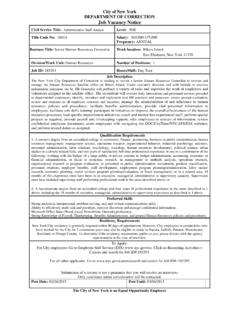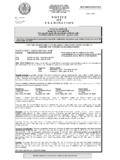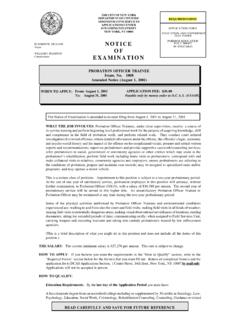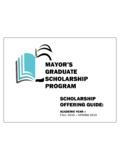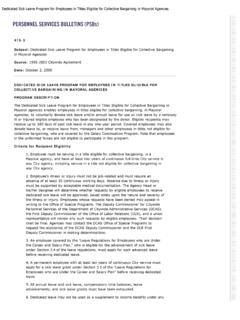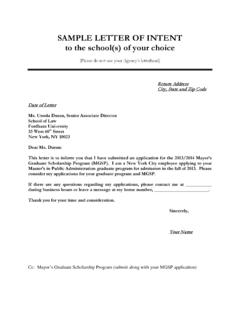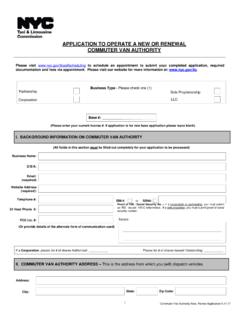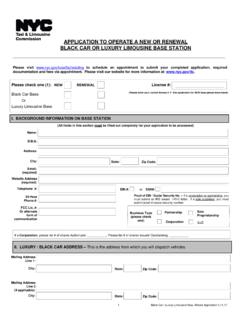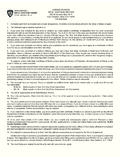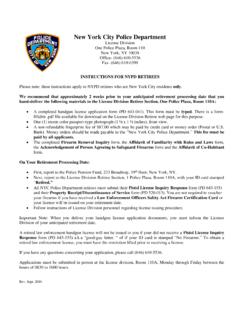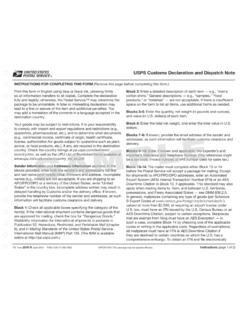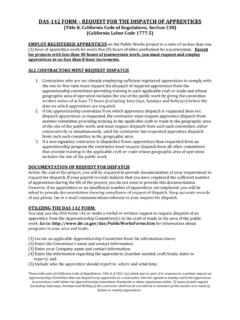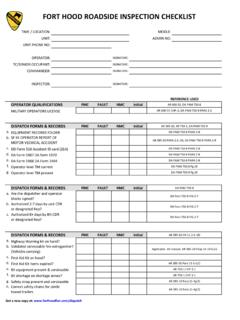Transcription of NEW YORK CITY TAXI AND LIMOUSINE COMMISSION Notice …
1 1 NEW york city TAXI AND LIMOUSINE COMMISSION Notice of promulgation of Rules Notice is hereby given in accordance with Section 1043(b) of the New york city Charter ( Charter ) that the Taxi and LIMOUSINE COMMISSION ( TLC ) promulgates amendments to its rules to incorporate a new chapter governing Dispatch Service Providers and to amend the rules surrounding dispatching FHVs through means other than communicating with a dispatcher. These rules are promulgated pursuant to Sections 1043 and 2303 of the Charter and Section 19-503 and 19-511 of the Administrative Code of the city of New york . These rules were published on April 24, 2015, for public comment in the city Record.
2 On May 28, 2015, a public hearing was held by the TLC at its offices at 33 Beaver Street, 19th Floor, New york , New york , 10004. These rules were approved at a TLC COMMISSION Meeting on June 22, 2015. These rules will take effect 30 days after publication. Statement of Basis and Purpose of Rule The New york city Administrative Code mandates the TLC license the operators of dispatch systems that convey information to drivers of licensed vehicles. For-hire vehicle ( FHV ) bases obtain base licenses from the TLC to operate these dispatch systems, and the TLC promulgated rules governing how bases managed customer interactions and dispatched to drivers and vehicles, usually by phone or two-way radio.
3 However, the rise of new technologies that can be used to dispatch vehicles and connect passengers with drivers has introduced new market entrants that do not fit neatly into the base licensure system. The TLC wants to ensure that companies providing these dispatch services for bases, through whatever technological means, can operate in New york city without having to purchase base license and a base, while still ensuring bases, drivers, and passengers are provided important protections. These rules accomplish this goal by introducing a new license for Dispatch Service Providers and increasing service standards for all bases to ensure that they too can take advantage of new technologies to provide for-hire service.
4 Under TLC s current rules, an entity that dispatches FHVs must either obtain a base license from the TLC or have a contract with an existing FHV base. By creating a new licensing structure for operators of dispatching services that contract with existing FHV bases ( Dispatch Service Providers ), the TLC accomplishes the following goals: Encourage Innovation Creating a separate license means Dispatch Service Providers will not need to obtain a base license to dispatch FHVs in New york city . Dispatch Service Providers do not have the added expenses and burdens of base licensure such as purchasing a base, maintaining parking, paying into a workers compensation fund, community board and COMMISSION approval, and affiliating a required number of vehicles.
5 This will allow companies to more easily take advantage of technological advances to offer for-hire services in New york city , while at the same time 2 ensuring that all players are adhering to important safety, transparency, accountability, and availability principles. Protect Bases and Drivers Currently, Dispatch Service Providers offer FHV service through agreements with licensed bases and are not accountable to the TLC. Dispatch Service Providers can cause bases or drivers to unintentionally violate TLC Rules, and TLC s only recourse in those circumstances is to enforce against bases and drivers, who may not have control over or knowledge of the bad behavior. Without the threat of a penalty, Dispatch Service Providers have diminished interest in limiting bases liability, creating a significant accountability gap.
6 Licensing Dispatch Service Providers closes this gap. Additionally, Dispatch Service Providers based in other states or countries that may choose to operate in NYC will not be able to disappear , leaving bases and drivers in the lurch. Licensing creates an official relationship between the Dispatch Service Provider and New york city and will ensure they have a stake in keeping drivers and bases in compliance with TLC Rules. Knowing that a licensed Dispatch Service Provider has a stake in their compliance with TLC Rules, all bases and drivers will be able to use Dispatch Service Providers, not just those with the means to negotiate and enforce contracts. Provide Uniform Standards for Passenger Protection All passengers are entitled to the same protections and price notifications, regardless of how their vehicles were dispatched to them.
7 Licensing Dispatch Service Providers ensures that they are required to provide the same services that bases are required to provide. The new Chapter 77 accomplishes these goals by requiring, among other things, that Dispatch Service Providers: File passenger data privacy and security policies with the TLC and follow New york State and federal laws for notification in the case of a data breach. Maintain working customer service contacts. Provide passengers with itemized receipts and notifications of all rates and fees. Give passengers the opportunity to request an estimate of the total fare in dollars and cents if a price multiplier or variable pricing policy is in effect.
8 Allow and require passengers to affirmatively accept all price multipliers and variable pricing policies. Provide passengers with the vehicle, driver, and affiliated base license number. Inform passengers complaining about drivers that only TLC can revoke or suspend a driver s license. Ensure that driver-facing interfaces operate via one touch or voice activation while the vehicle is in motion. Collect and submit trip data. Provide an option to request an accessible vehicle. Notify the TLC when changing the way in which they comply with requirements that drivers or passengers receive information. FHV bases are already accountable to the TLC through their base license structure.
9 However, as bases move towards offering passenger a way to book FHV service without speaking directly to 3 a dispatcher, the TLC needs to ensure that passengers still receive important information about the requested trip, including the rate and vehicle and driver information. Since there is no person on the phone to answer questions such as what rates are in effect for a trip and how much the trip will cost, these rules require that this important information be provided to passengers regardless of how a passenger books a trip. Additionally, as more bases utilize technology that collects large amounts of passenger information, including credit card and geo-location data, passengers need to be sure this information is kept safe and secure.
10 The TLC has also heard complaints that, as technology more quickly connects passengers with drivers, vehicles have been waiting in the passenger pickup areas of the airports, causing congestion and clogging lanes as drivers wait for potential dispatch requests. To address these concerns, the rules require, among other things, that all bases: File security and privacy policies with the TLC if they collect private information, as defined by state law, and follow New york State and federal laws for notification in the case of a data breach. Have a working e-mail or telephone number for customer service. Use their own names on any passenger facing booking tool and inform passengers of their rates in any passenger-facing booking tool that does not involve speaking to a person.
